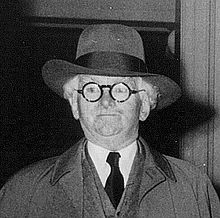E. H. Crump
| E. H. Crump | |
|---|---|

Crump in 1945
|
|
| Member of the U.S. House of Representatives from Tennessee's 10th district |
|
|
In office March 4, 1931 – March 3, 1933 |
|
| Preceded by | Hubert Fisher |
| Succeeded by | Redistricted to 9th district |
| Member of the U.S. House of Representatives from Tennessee's 9th district |
|
|
In office March 4, 1933 – January 3, 1935 |
|
| Preceded by | Jere Cooper |
| Succeeded by | Walter Chandler |
| Mayor of Memphis | |
|
In office 1910–1915 |
|
| Preceded by | James H. Malone |
| Succeeded by | George C. Love |
| Personal details | |
| Born |
Edward Hull Crump October 2, 1874 Holly Springs, Mississippi |
| Died | October 16, 1954 (aged 80) Memphis, Tennessee |
| Political party | Democratic |
Edward Hull "Boss" Crump (October 2, 1874 – October 16, 1954) was an American politician from Memphis, Tennessee. Representing the Democratic Party, he was the dominant force in the city's politics for most of the first half of the 20th century, during which the city had a commission form of government. He also dominated Tennessee state politics for most of the time from the 1920s to the 1940s. He was elected and served as mayor of Memphis from 1910 through 1915, and again briefly in 1940. But, he effectively appointed every mayor elected from 1915 to 1954.
A native of Holly Springs in northern Mississippi, where he was born in 1874, Crump at the age of 19 moved to Memphis, Tennessee on September 21, 1893, according to the Holly Springs Reporter. When he first arrived in Memphis, the ongoing Panic of 1893, the worst recession in the United States history to that time, made it hard for Crump to find work. Eventually, he obtained a clerical position with Walter Goodman Cotton Company located on Front Street in downtown Memphis. This was the start of a successful business career as a broker and trader.
In early 1901, Crump began seriously courting a 23-year-old young woman by the name of Bessie Byrd McLean. Bessie, or "Betty," McLean was a prominent Memphis socialite and has been described as "one of the city's most beautiful and most sought after women." She was the only child of Mr. and Mrs. Robert McLean. Her father was then serving as the vice president of the William R. Moore Dry Goods Company. Crump and McLean were married on January 22, 1902 at the Calvary Episcopal Church.
Alongside his rising business career, Crump began to make the political connections that served him for the rest of his life. He was a delegate to the Tennessee Democratic State Convention in 1902 and 1904. In 1905, he was named to the municipal Board of Public Works, and was elected to the powerful position of Commissioner of Fire and Police in 1907, among three commissioners who governed the city.
Starting in the 1910s, Crump began to build a political machine which came to have statewide influence. He was particularly adept in his use of what were at the time two politically weak minority groups in Tennessee: blacks and Republicans. Unlike most Southern Democrats of his era, Crump was not opposed to blacks voting; Memphis blacks were reliable Crump machine voters for the most part. The party often paid the poll taxes required by state law since the late 1880s; otherwise this requirement resulted in disenfranchising many poor blacks. One of Crump's lieutenants in the black community was funeral director N. J. Ford, whose family (in the persons of several sons, including Harold Sr. and John Ford, daughter Ophelia, and grandson Harold, Jr.) became influential in Memphis, state and national politics, continuing to be so today. A relationship developed in which blacks aided Crump, and he aided them, as was usual in politics. Crump also skillfully manipulated Republicans, who were numerically very weak in the western two-thirds of the state due to the disenfranchisement of blacks, but dominated politics in East Tennessee. Frequently, they found it necessary to align with Crump in order to accomplish any of their goals in the state government.
...
Wikipedia
